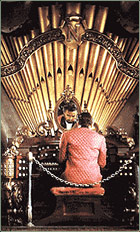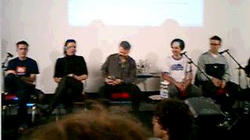|
This is my dynamic, frequently updated homepage. This is a NewsLog, also known as a WebLog or Blog.
Everything is evolving, so don't assume too much.
People to watch:
Adina Levin
Andrius Kulikauskas
Britt Blaser
Catherine Austin Fitts
Chris Corrigan
Clay Shirky
Dan Gillmor
Dave Pollard
David Allen
David Weinberger
Dewayne Mikkelson
Dina Mehta
Doc Searls
Elisabet Sahtouris
Elizabeth Lawley
Euan Semple
Florian Brody
Frank Patrick
Gen Kenai
George Dafermos
George Por
Graham Hancock
Greg Elin
Hazel Henderson
Heiner Benking
Inspector Lohman
Jean Houston
Jerry Michalski
Jim McGee
Jim Moore
John Abbe
John Perry Barlow
John Robb
Joi Ito
Jon Husband
Jon Lebkowsky
Jon Udell
Jonathan Peterson
Judith Meskill
Julian Elvé
Julie Solheim
Kevin Marks
Lawrence Lessig
Leif Smith
Letecia Layson
Lilia Efimova
Lisa Rein
Marc Canter
Mark Oeltjenbruns
Mark Pilgrim
Mark Woods
Martin Dugage
Martin Roell
Mary Forest
Matt Mower
Max Sandor
Michael Fagan
Mike Owens
Mikel Maron
Mitch Kapor
Mitch Ratcliffe
Nathalie dArbeloff
Netron
Noam Chomsky
Paul Hughes
Peter Kaminski
Phil Wolff
Philippe Beaudoin
Ray Ozzie
Raymond Powers
Rebecca Blood
Roger Eaton
Roland Tanglao
Ross Mayfield
Scott Lemon
Sebastian Fiedler
Sebastien Paquet
Skip Lancaster
Spike Hall
Steven Johnson
Stuart Henshall
Thomas Burg
Thomas Madsen-Mygdal
Thomas Nicholls
Timothy Wilken
Todd Suomela
Tom Atlee
Tom Munnecke
Tom Tomorrow
Ton Zijlstra
Lionel Bruel
Loic Le Meur
Nancy White
Mark Frazier
Merlin Silk
Robert Paterson
Colby Stuart
Nova Spivack
Dan Brickley
Ariane Kiss
Vanessa Miemis
Bernd Nurnberger
Sites to watch:
Edge
Junto
Absara
Rhizome
Nanodot
HeadMap
Openworld
FutureHi
Imaginify
Do No Harm
BoingBoing
Smart Mobs
Webcamorama
MetaFilter
NotThisBody
Disinfopedia
YES Magazine
Collective Web
WorldChanging
Disinformation
Escape Velocity
Space Collective
Friendly Favors
Emergent by Design
Independent Media
Global Ideas Bank
Forbidden Science
Greater Democracy
ThoughtsOnThinking
Disclosure Project
Explorers Foundation
Manufacturing Dissent
Collective Intelligence
Action without borders
Free Expression Network
Co-intelligence Institute
Electronic Frontier Foundation
French:
Emmanuelle
Manur
Elanceur
Loeil de Mouche
IokanaaN
Blog d'Or
Le Petit Calepin
GeeBlog
Absara
Guillaume Beuvelot
Ming Chau
Serge Levan
Jean Michel Billaut
C'est pas Mécanique

I live in Toulouse, France where the time now is:
01:06
Unique Readers:

Primarily
Public Domain
Everything I've written here is dedicated to the
Public Domain.

The quotes from other people's writings, and the pictures used might or might not be copyrighted, but are considered fair use. Thus, overall, this weblog could best be described as being:
Primarily Public Domain. |
Syndication:
 ![Validate my RSS feed [Valid RSS]](http://www.newciv.org/pic/valid-rss.png)
|
| Monday, February 24, 2003 |  |
|
|
|
 Some hundreds of years ago the technology of ship building advanced so that it became practical to travel the oceans for extended periods of time. Thus whole new territories were opened to exploration and possible domination. Some hundreds of years ago the technology of ship building advanced so that it became practical to travel the oceans for extended periods of time. Thus whole new territories were opened to exploration and possible domination.
It became clear that it was impractical to assume that the law and order of the land could be applied to the sea. Thus the oceans became a zone of lawlessness and a battleground for whomever chose to enter the arena. It also became clear that those who fared best were those who mastered all the elements of survival at sea and who did their business under the veil of secrecy. It is those who mastered this game that we can call The Great Pirates.
A Great Pirate succeeded because of his comprehensive command of a whole set of different disciplines. He had a high proficiency in dealing with celestial navigation, the sea, the storms, the ship, the men, economics, biology, geography, history, and science. The better the Great Pirate could understand and anticipate the whole scene, the better he would do.
Great Pirates would travel, bargain, plunder, plan, negotiate, battle, and much more. He would use the science of ship building to amass a fleet, he would use his people skills to manage his crew and to negotiate with representatives of far away lands. He would do his activities out of sight of people on land and of his competitors.
A Great Pirate would naturally want to maintain his position, and he had to sleep once in a while. He therefore at first surrounded himself with dull-witted but loyal men of muscle. Only he himself planned and coordinated his operations, and his men simply did what they were told. However, when the Great Pirate expanded his operations it became clear that he needed something more than that.
The Great Pirate invented the brilliant scheme of specialization. It is both the way to expand his empire with skilled assistance and at the same time the assurance that only HE will ever know the full picture of what is going on.
The Great Pirates started to encourage and employ people of great skill in specialized areas. There might be, for example, a greatly skilled and experienced Navigator. And there might be a master Weapon Builder, an accomplished Master Historian, a Politician, a Ship's Captain, a General, and so forth.
Each of those people were cultivated to a high level of skill. But also, it was made clear to each one that they had better stay within their specific field, or they would lose their head.
The Great Pirate himself would be the ONLY person who knew the whole picture. He would know the plan, he would know where ships would go and why, he would know what they would find, who they would meet, he would know what to trade and what to steal, he would know who to trust and who not to. None of his people would ever be allowed near the full picture, and none of them could therefore possibly replace him. And thus his position was safe from any coup by those close to him. He always kept the true full picture in utmost secrecy and kept the skills and knowledge of all his people perpetually compartmentalized.
Through the ingenious scheme of specialization and compartmentalization of knowledge, the Great Pirates were able to expand their business immensely. They were able to expand their influence into different lands through carefully chosen and educated front people. They would chose local strong men in different territories, supply them with what they needed to assume power, educate them to present a proper public facade, but never giving them the knowledge of all the pieces in the game. The local strong man might be maneuvered into a position of King, assumed by his people to be the utmost authority, but in essence simply being another of the specialized agents of the hidden Great Pirates. The Great Pirate would naturally also cultivate agents in the fields of religion, education, science, military, banking, and so forth, and would naturally be able to play them out against each other if any one of them ever got ambitious beyond his assigned role.
The Great Pirate knew the world was round when everybody else were kept in the belief that it was flat. He knew about grand logistical schemes, he knew about international exchange media and trade balancing, and much more. He was the only one who saw the whole picture of the planet and its resources, and was therefore able to play his game totally unnoticed by the vast majority of the population of the planet. All through the magic of specialization ...
--- The above is my shortened rendition of what Bucky Fuller described in his book "Operating Manual for Spaceship Earth", in the chapter "Origins of Specialization"
[ Culture | 2003-02-24 06:03 | | PermaLink ] More >
|
|
| Sunday, February 23, 2003 |  |
|
|
|
 It is a couple of years since I sold my motorcycle and started driving a car again. Don't have a good reason to wear a leather jacket. And I haven't had a cigarette for a year or so. I'm a bit afraid I'm losing touch with my more rebellious side. Well, I kind of have a need for balancing things out, because people too easily assume I'm just this nice, decent, boring guy, and they get shocked if I say fuck or something. Well, maybe I just AM nice and boring, and I just imagine myself being a rebel. I don't know. But as to the smoking, now being pretty much a non-smoker, I can safely mention that a fairly significant motivation for me to smoke was to protest the nearly total brainwashing of the American population on that subject. Nobody believed it when I was smoking, that it would be my small way of giving a raised middle finger to the media-driven American bourgeoisie. Yeah, a pathetic small finger maybe, but nevertheless. A vote for freedom. Mostly I smoked because I enjoyed it, and because the plusses outweighed the minuses at the time. Smoking is very addictive. I'd believe it is as addictive as heroin. Very hard to stop. And you smell like an ashtray and you've got to work harder to be in shape. I don't think anybody actually thinks smoking is healthy. But, well, it isn't healthy either to drive sports cars, or to skydive or to go river rafting or to walk around barefooted in the Amazon jungle. Messy, dangerous, and fun. There are a lot of things that make life more full, more exciting, more worth living. Many of those things require that one accepts the possibility of death. But in the United States, billions of dollars of advertising and millions of reformed smokers have turned smoking into not just another risky but pleasurable choice, like whisky and mountain climbing, but into the most despised plague they can imagine. No dignity left in smoking in the U.S. I got really tired of otherwise well-meaning friends and strangers who again and again would walk up to me and say, essentially, "YOU'RE GOING TO DIE!!!". Well, I know I'm going to die. The death rate is 100%, both for smokers and non-smokers. But many ex-smokers, who themselves managed to quit only by implanting their own minds with horrible pictures of imminent death and great suffering associated with smoking, actually believe that it will help others that they curse them whenever they see them smoking. I'm sensitive to such things, as I'm trained in NLP and hypnosis, and I know very well what great power there is in the things we tell ourselves and others, particularly the things we say like we really mean it, and that we say again and again and again and again. And the power of peer pressure and advertising. So, American smokers are mostly a miserable lot by now, apologetic addicts who need to sneak outside on the sidewalk like homeless outcasts. Disheveled losers without will power. Good citizens will grimace and cough when they're within 50 feet, and will take their children over to the other sidewalk. It is a couple of years since I sold my motorcycle and started driving a car again. Don't have a good reason to wear a leather jacket. And I haven't had a cigarette for a year or so. I'm a bit afraid I'm losing touch with my more rebellious side. Well, I kind of have a need for balancing things out, because people too easily assume I'm just this nice, decent, boring guy, and they get shocked if I say fuck or something. Well, maybe I just AM nice and boring, and I just imagine myself being a rebel. I don't know. But as to the smoking, now being pretty much a non-smoker, I can safely mention that a fairly significant motivation for me to smoke was to protest the nearly total brainwashing of the American population on that subject. Nobody believed it when I was smoking, that it would be my small way of giving a raised middle finger to the media-driven American bourgeoisie. Yeah, a pathetic small finger maybe, but nevertheless. A vote for freedom. Mostly I smoked because I enjoyed it, and because the plusses outweighed the minuses at the time. Smoking is very addictive. I'd believe it is as addictive as heroin. Very hard to stop. And you smell like an ashtray and you've got to work harder to be in shape. I don't think anybody actually thinks smoking is healthy. But, well, it isn't healthy either to drive sports cars, or to skydive or to go river rafting or to walk around barefooted in the Amazon jungle. Messy, dangerous, and fun. There are a lot of things that make life more full, more exciting, more worth living. Many of those things require that one accepts the possibility of death. But in the United States, billions of dollars of advertising and millions of reformed smokers have turned smoking into not just another risky but pleasurable choice, like whisky and mountain climbing, but into the most despised plague they can imagine. No dignity left in smoking in the U.S. I got really tired of otherwise well-meaning friends and strangers who again and again would walk up to me and say, essentially, "YOU'RE GOING TO DIE!!!". Well, I know I'm going to die. The death rate is 100%, both for smokers and non-smokers. But many ex-smokers, who themselves managed to quit only by implanting their own minds with horrible pictures of imminent death and great suffering associated with smoking, actually believe that it will help others that they curse them whenever they see them smoking. I'm sensitive to such things, as I'm trained in NLP and hypnosis, and I know very well what great power there is in the things we tell ourselves and others, particularly the things we say like we really mean it, and that we say again and again and again and again. And the power of peer pressure and advertising. So, American smokers are mostly a miserable lot by now, apologetic addicts who need to sneak outside on the sidewalk like homeless outcasts. Disheveled losers without will power. Good citizens will grimace and cough when they're within 50 feet, and will take their children over to the other sidewalk.
[ Diary | 2003-02-23 23:59 | | PermaLink ] More >
|
|
|
|

There will be a European conference on weblogs, BlogTalk in Vienna, Austria on May 23-24. Probably doesn't work for me to go, unless some unexpected cash appears. But sounds very good. A number of names I recognize there. It is about "web-based publishing, communication and collaboration tools for professional and private use. The primary goal of BlogTalk is to inventory the current and emerging uses of blogs. Active bloggers as well as people from the fields of business and education are invited to attend."
[ Information | 2003-02-23 23:59 | | PermaLink ] More >
|
|
|
|
(For the uninitiated, RSS is the format used to create syndicated "feeds" from weblogs, which can be picked up by "aggregator" programs.) Joi Ito asked his readers about opinions on whether it is nice to include full text in one's RSS feeds or not. I had been thinking about the same. Some feeds have only a one line summary, others have full, long articles. I've been a bit uncertain on how to configure my own program here, to make most people happy. Seems like the answer Joi got was to make several feeds, so people can get what they want.
One remaining question I would have is what to do about pictures. Most of my posts have pictures, but I leave those out of the RSS feed, because I figure some people would feel they don't belong in the news feed itself. Some people post lots of huge pictures in their feed. Hm, I suppose the answer is the same: to have multiple feeds with different options.
[ Technology | 2003-02-23 23:59 | 0 comments | PermaLink ]
|
|
|
|

Lots of pictures from the peace protests last week. Above is a picture from the air from the beach here in Santa Monica. I woke up too late to make it, unfortunately.
[ Inspiration | 2003-02-23 23:59 | | PermaLink ] More >
|
|
| Friday, February 21, 2003 |  |
|
|
|
 Something opens our wings.
Something makes boredom and hurt disappear.
Someone fills the cup in front of us.
We taste only sacredness. --Rumi
The picture: "A man jumps into an ice-hole at the lake Shartash in the Ural city of Yekaterinburg, about 900 miles east of Moscow, Friday, Feb. 21, 2003. The temperature in Yekaterinburg was minus 15 degrees Celsius (5 degrees Fahrenheit) on Friday. (AP Photo/ Ural Press Photo, Alexei Vladykin)" (From Yahoo)
[ Inspiration | 2003-02-21 23:59 | | PermaLink ] More >
|
|
| Thursday, February 20, 2003 |  |
|
|
|

This is the front panel of an HP 3000 Series II minicomputer. Not a good picture, but the best one I could locate. It was my first hands on entry into the world of computers. That was around 1975-76.
I went to high school in Denmark where I grew up. "Holte Gymnasium" (the name of the school) wanted to be very progressive and top notch, so they had invested a considerable amount of money in this computer, which made it possible to introduce computer programming classes to students who wanted them. Most of the math & science types signed up, and a considerably smaller group stuck with it and became computer nuts. I was in the Fortran class. The other choice was Algol.
There was a whole room set aside for the computer. The CPU itself was like a small refrigerator, and its harddisk was about the same size. 10MB I believe. The way you started the computer was that you punched in several binary words on one of the sets of 16 lighted switches on the front. That formed the binary instructions to read in the boot loader. The boot loader, the program that would actually start the operating system, was read on hole punch tape. You know, a paper streamer with holes across, each column representing one letter. The program is read in, and it figures out how to load the actual system from the harddisk.
We didn't have any terminal with a screen the first year or so. What we used was teletype machines. Looks like an oldfashioned telex machine. A big electric typewriter. It could be used in online or offline mode. If you type commands to the operating system, it would answer by writing on paper. Or, you could sit and type in a program, which goes directly onto punch tape. And then you would go and insert the punch tape in the tape reader, type a command on the teletype to load it, and the computer reads it in. And you can then store it on the harddisk and run it.
Typically what we would run would be little programs that printed out multiplication tables or square roots or something. Seemed like magic at the time, when the alternative was to use a slid erule or look the approximate answer up in a book. And later we got into little games, implementing known algorithms for solving little matchstick games and that kind of thing. But then there was also the Star Trek game. A lively action game where you're the Enterprise hunting Klingons. The graphics consisted a little 10x10 square of ASCII characters printed out on the printer after each turn, showing what is going on in the current sector. Kids today would probably not be able to fathom how anybody could use hundreds of hours on playing that, but it was rather addictive.
One could reserve the computer in one-hour blocks after school. Every night the lights were on in that room way into the night, and it wasn't unheard of that somebody fell asleep there. There wasn't really more than a dozen or so people who really got into it, but they filled up the whole schedule. Myself and my buddy Morten filled up many slots. So did another aspiring programmer who went on to considerably greater heights with what he learned than I did. Anders Hejlsberg who was one grade below me, wrote what later on became the revolutionary Turbo Pascal compiler after he finished high school. And later on he was leading the projects that developed Borland Delphi, and Microsoft C#. I wonder what he learned on that teletype machine that I didn't learn. Maybe he went with the Algol class and spent less time playing Star Trek.
Anyway, I just wanted to mention some ancient history, since many younger people today are born after that time, and have a hard time imagining a world before 3D graphics and Internet connections. And they probably wouldn't think of finding great joy in producing page after page filled with square roots.
[ Diary | 2003-02-20 22:23 | | PermaLink ] More >
|
|
|
|
 The following is a press communique and statement from the Club of Budapest, dated yesterday. The Club of Budapest is a global think-and-action tank with a hundred members including the Dalai Lama, Mikhail Gorbachev, Archbishop Tutu, Elie Wiesel, Peter Ustinov, Jane Goodall, Peter Russell, Ervin Laszlo and many others. First Ervin Laszlo, President of the Club of Budapest, has this to say: The following is a press communique and statement from the Club of Budapest, dated yesterday. The Club of Budapest is a global think-and-action tank with a hundred members including the Dalai Lama, Mikhail Gorbachev, Archbishop Tutu, Elie Wiesel, Peter Ustinov, Jane Goodall, Peter Russell, Ervin Laszlo and many others. First Ervin Laszlo, President of the Club of Budapest, has this to say:"Times are over when questions of war and peace could be decided in the context of international power politics. Right cannot be decided by might, in the international field any more than in the personal domain. In an interdependent global community every war between nations is fundamentally a civil war." Here is some other good stuff from the press communique:Terrorists and potential aggressors must be stopped, but war is not the way to stop them. Warfare must be replaced by dialogue leading to mutual understanding as a basis of multilateral cooperation in regard to relations among nations in the political as well as in the economic and the ecological spheres.
According to the Club of Budapest, the project of creating a structure of global cooperation beyond the veto-power and special status of individual states is best pursued in the framework of a 'World Futures Council' as proposed among others by Mikhail Gorbachev and Jacob von Uexkuell. The Council is to be constituted of one hundred independent individuals of high integrity who place the shared human interest above any parochial national or cultural interest. The Club of Budapest takes an active part in the creation of such a Council and will promote its work with special attention to questions of civil and political values and perceptions, and the humanism and sustainability of the policies motivated by them. I very much agree with that. It is pretty insane to have global wars run by local politicians, either trying to police areas outside their own jurisdiction, or simply for the purpose of improving their chances of re-election, and for filling the coffers of their own business associates. I think there are some important points being made there, so here is the full statement signed by members of CofB:WAR: A CRIME AGAINST HUMANITY
The time has come for the world community to recognize that war, rather than an instrument for the elimination of terrorists and aggressors, is a crime against humanity. It is itself an act of aggression that threatens human life, and the environment on which human life vitally depends.
No other species kills massively its own kind: war is a uniquely human phenomenon. Such killing was never justified, but it had a marginal warrant at a time when war was waged among neighboring groups for the acquisition of territory with natural and human resources and could be limited to the territories and the warriors of the protagonists. At a time when resources are not limited to defined territories and hostilities cannot be contained, war is neither politically nor economically justified. Given that modern warfare kills innocent civilians, inflicts serious damage on the life-supporting environment, and may escalate to a global conflagration, waging war needs to be declared a crime against humanity. No nation-state should have the legitimate right to wage war against any other nation-state.
The stockpiling of weapons of mass destruction is not a warrant for waging war. Weapons of mass destruction whether they are nuclear, chemical, biological, or conventional are a threat to human life and habitat by whoever possesses them. They are not tolerable in the hands of any state, whether it is large or small, rich or poor, and headed by a dictator or by an elected politician. Such weapons need to be eliminated from the arsenals of every state, a task that is not the self-declared prerogative of any government but the responsibility of the global community of all peoples and states. There will be no lasting peace on earth until all weapons of mass destruction are destroyed, their production and stockpiling proscribed, and strategies calling for their use replaced by strategies of dialogue, negotiation and, if necessary, internationally agreed economic and political sanctions.
Attempting to eliminate weapons of mass destruction with weapons of mass destruction is to fight violence with violence on the principle of an eye for an eye and a tooth for a tooth, a policy that can end up making everyone blind and toothless. Aggressors and terrorists must be stopped, but war is not the way to stop them.
[ Politics | 2003-02-20 22:59 | | PermaLink ] More >
|
|
|
|
|
|
| Wednesday, February 19, 2003 |  |
|
|
|
 Jon Husband mentions an interesting paper by Samuel R. Smith called "Postmodernism is Dead, Now What? Distributed Culture and the Rise of the Network Age". Nice explanations of how different meta-narratives define different ages. There's not quite widespread agreement about what those ages exactly are, but it is still a very useful thing to examine. So here it goes from Modernism to Post-Modernism to the Network Age. I can go along with that, I think. In this presentation Modernism is the "Age of the Monolith". Big centralized companies and governments and ideologies. Lots of centralized stuff being built and sometimes colliding (world wars, cold war). He dates it from early 20th century to the 1960s. Next would naturally be Post-Modernism, the "Age of Deconstruction". That's more about destruction, tearing down the rigid dominant institutions and morals and norms. No longer can you have the same job for life, and the world is turning into a rather confusing place in many ways. But clearing things out can be a good thing. Jon Husband mentions an interesting paper by Samuel R. Smith called "Postmodernism is Dead, Now What? Distributed Culture and the Rise of the Network Age". Nice explanations of how different meta-narratives define different ages. There's not quite widespread agreement about what those ages exactly are, but it is still a very useful thing to examine. So here it goes from Modernism to Post-Modernism to the Network Age. I can go along with that, I think. In this presentation Modernism is the "Age of the Monolith". Big centralized companies and governments and ideologies. Lots of centralized stuff being built and sometimes colliding (world wars, cold war). He dates it from early 20th century to the 1960s. Next would naturally be Post-Modernism, the "Age of Deconstruction". That's more about destruction, tearing down the rigid dominant institutions and morals and norms. No longer can you have the same job for life, and the world is turning into a rather confusing place in many ways. But clearing things out can be a good thing."If a society stops building and begins dynamiting the foundations on which it is built, it's safe to assume that society is preparing for something more elaborate than what's being dismantled." And that next thing would be the "Network Age" since the early 90s. A new distributed social order. The Internet. Electronic bank cards. More focus on individual citizens and customers. More choices for everything.
I enjoy reading big meta stuff like that. But we could certain slice it in a number of different ways, depending what exactly we look at. And what I'm personally most interested in is what comes next. Once a network is ubiquitous and very new things emerge. Social mobs. Direct democracy. Collective life forms. We're still in an age of Confusion and Dis-continuity. I'm looking for the Integration, for what happens when things come together, according to the tune of a higher order.
[ Organization | 2003-02-19 20:51 | | PermaLink ] More >
|
|
|
|
 Seb mentions a site with an excellent and comprehensive lexicon of ways to "win" in a conversation by dirty communication tricks. It would be valuable for most people to be very aware of these mind tricks so that you might be prepared, and so you might avoid the diversions others are trying to pull on you. Seb mentions a site with an excellent and comprehensive lexicon of ways to "win" in a conversation by dirty communication tricks. It would be valuable for most people to be very aware of these mind tricks so that you might be prepared, and so you might avoid the diversions others are trying to pull on you."As you mature emotionally (or mentally, or spiritually), you will grow out of your present way of thinking, and you will eventually come around to my point of view"
"You weren't breast fed as a child, were you?"
"Well, if you think me such a terrible, horrible person..."
"Your last sentence ended with a preposition. Please restate it properly."
"You said this happened five years before Hitler came to power. Why are you so fascinated with Hitler? Are you anti-Semitic?"
Join a Health Spa: "Don't you care about your own body?"
"I don't want to spend a lot of time on this, but..." (blah, blah, blah...) There's a ton more.
[ Information | 2003-02-19 21:46 | | PermaLink ] More >
|
|
| Tuesday, February 18, 2003 |  |
|
|
|
 This is what I want: resources of all kinds that are filtered and ranked according to people I trust and respect. This is what I want: resources of all kinds that are filtered and ranked according to people I trust and respect.
I assume it is a complicated problem, since I don't have it yet, because I'm for sure not the first person to think about it. But I believe it can be solved, if some capable person can work out the math.
The Google PageRanking mechanism is the most successful collaborative ranking mechanism there is, which is able to successfully operate on a huge dataset. For those of you who for some strange reason don't know, Google will rank webpages not only based on what words appear in them and how prominently they appear, but based on how many other websites carry link to that particular page, and how many websites carry links to those websites, and so forth, producing a surprisingly accurate and fair ranking mechanism.
I wouldn't know how to implement that myself. But the basic formulas are available, and Google does it with hundreds of millions of pages, so of course that can be figured out.
But what I want is to do a personalized version of that kind of thing, based on choices I've made about other people, other websites, or about anything else, like books or movies or brands of shampoo. I want not just to get the aggregate 'best' choices, chosen by all websites in the world. I want the best choices by people I know, like, respect or trust, or by the people that they again know, like, respect or trust. And I want a similar, complicated huge matrix calculation that adds all of that up, just for me. And for you.
I'm also talking about involving more dimensions than just the number of links. I want to add up the qualitative judgements of people I have a high opinion of, or that I'm likely to have a high opinion of. So, the further that gets from the choices I explicitly already made, the less value they'd have.
No, I'm not just talking about Amazon being pretty good at recommending books I might want to read. They do that well, and it is a practical and working example of collaborative filtering, but I doubt that their math is very fancy, as they really just recommend other popular choices in the categories I've looked in myself.
I want the algorithm that accurately and fairly adds up the collective advice implicitly given to me by my friends and friends of friends by their aggregated choices, weighted by how trusted their opinions are in relation to me. I mean, I suspect that it is just a formula and an algorithm for calculating a ranking value. Something that can be explained in abstract math, and then we can go and figure out what specific values are included and where they'd come from. If it is impractical to calculate at this point without quantum computers, I'd like to know that too. But I suspect it is perfectly feasible to do this well.
[ Technology | 2003-02-18 03:07 | | PermaLink ] More >
|
|
|
|
I'm very fond of the chaordic principles that Dee Hock developed. They are principles for growing self-organizating organizations and achieving a fertile balance between chaos and order. Hock created the VISA organization that way. Now, Mitch Ratcliffe has some excellent insights into where that works and doesn't work. And he knows what he's talking about.I've been at a board retreat of the Chaordic Commons for the past two days. It has been a study in frustration. The whole point of this organization has been to support and disseminate notions developed by Dee Hock that have already proven they can guide the founding of healthy, democratic shared-ownership and self-organizing organizations. The problem with the Commons, unlike the organizations actually using chaordic thinking, is that in every case, successful chaords form to accomplish some goal or profit (in the form of betterness of a situation as well as financial profit) while the Commons has no shared ends except the propagation of chaordic principles. Now, there's a situation I personally trap myself in from time to time, so I recognize that. If you put even the smartest and most well-intentioned people together, without clearly defining the agenda, and you expect that a unified course of action somehow will emerge amongst them - you will usually fail. I heard Mitch point it out very clearly on the phone the other day. For chaordic principles to work, it requires a shared goal and a shared set of limited resources. We've got to have a very similar outcome in mind, and there will have to be obstacles and a scarcity of resources in our way, for us to be inspired to self-organize. If we don't agree on what needs doing, or we can do it just as well separately, it is unlikely that we choose to become an organization.
None of that, of course, stops specific people, within a larger fuzzy group, from getting together and choosing something to do, and organizing themselves around that. But that's a different thing, I think. Like in Open Space. Interesting groups would form, even if there weren't any overall purpose stated. But then I suppose we'd regard it as several organizations rather than one organization. It won't all become one self-organizing entity unless there's a shared purpose and shared constraints. Hm, still something I don't think I've quite figured out here.
[ Organization | 2003-02-18 23:59 | 0 comments | PermaLink ]
|
|
| Monday, February 17, 2003 |  |
|
|
|
Joi Ito in Tokyo have posted the paper he was working on, on Emergent Democracy. Our online meeting happening was leading up to this, as was inspired discussions over e-mail the last couple of days, which I unfortunately didn't get around to participating in. But it is good stuff, which Joi hopes to make more perfect later on."...[T]he tools and protocols of the Internet have not yet developed the necessary features to allow emergence to create a higher-level order. These tools are being developed and we are on the verge of an awakening of the Internet. This awakening will facilitate the anticipated political model enabled by technology to support some of the basic attributes of democracy, which have eroded as power has become concentrated within corporations and governments. It is possible that new technologies may enable a higher-level order through emergent properties, which will enable a form of emergent direct democracy capable of managing complex issues more effectively than the current form of representative democracy." He gives a fine overview of various principles, models, trends and technologies, and points to how the weblog community shows much better hope for emergence to take place than traditional webpages do. In part because there's a feedback loop taking place. And the current breed of tool builders are quite likely to come up with key pieces that might make all the difference in taking it further. And here's a conclusion I most certainly can stand behind as well:"The world needs emergent democracy more than ever. The issues are too complex for representative governments to understand. Representatives of sovereign nations negotiating with each other in global dialog are also very limited in their ability to solve global issues. The monolithic media and their increasingly simplistic representation of the world can not provide the competition of ideas necessary to reach consensus. Emergent democracy has the potential to solve many of the problems we face in the exceedingly complex world at both the national and global scale. The community of toolmakers will build the tools necessary for an emergent democracy if the people support the effort and resist those who try to stifle this effort and destroy the commons."
[ Organization | 2003-02-17 23:59 | | PermaLink ] More >
|
|
|
|
 Some news about Highlift Systems who are planning on building elevators to geostationary orbit. They may have found a second location for the anchor of their space elevator - Perth, Western Australia, which apparently has the calm waters and international airport needed. The whole project has apparently gotten more momentum after the shuttle disaster. And with a startup cost of 7-10 billion, it will need a lot more support. Some news about Highlift Systems who are planning on building elevators to geostationary orbit. They may have found a second location for the anchor of their space elevator - Perth, Western Australia, which apparently has the calm waters and international airport needed. The whole project has apparently gotten more momentum after the shuttle disaster. And with a startup cost of 7-10 billion, it will need a lot more support. It would act like the cable in the centre of a lift, with lift cars which could take people into space and back. The earth end of the ribbon would be connected to a terminal floating on the ocean about 100km off the coast which would use Perth Airport as an international contact point. Each lift car would be able to carry up to six people, with luggage and air supply. Travellers would be taken as a first step 100,000km into space to a space station. The station could be connected to more ribbons for journeys on to the moon or beyond. It might potentially reduce launch costs from the current $10-40,000 per kilogram to $100 per kilogram.
[ Technology | 2003-02-17 23:59 | | PermaLink ] More >
|
|
|
|
 Boeing are doing successful tests of planes with broadband Internet connections. 20-Mbit/second satellite connection for each plane, with ethernet by each seat. Still just a test, but they hope to install it more widely in 2004. Boeing are doing successful tests of planes with broadband Internet connections. 20-Mbit/second satellite connection for each plane, with ethernet by each seat. Still just a test, but they hope to install it more widely in 2004.
Thomas Madsen-Mygdal mentioned a little while ago that the linx train between Copenhagen and Gothenburg is the first train with a broadband connection.
What is interesting for both is not just that passengers can access the net, but also that it opens new possibilities for the crew, and better interactivity with the surrounding world. The train, for example, might be better at reporting its own position, and the crews in the planes might be more able to do their own flight planning.
[ Technology | 2003-02-17 23:59 | | PermaLink ] More >
|
|
|
|

Keep walking, though there’s no place to get to. Don’t try to see through the distances.
That’s not for human beings. Move within, but don’t move the way fear makes you move. --Rumi
[ Inspiration | 2003-02-17 23:59 | | PermaLink ] More >
|
|
| Sunday, February 16, 2003 |  |
|
|
|
 Below is an article I wrote a number of years ago about how the money system works and what is wrong with it. Maybe I'd put more nuances in it today, but I still believe it is basically correct. Most people don't really have any clue about money and think it is being 'made' by doing good work. It isn't. It is being made by borrowing it from somebody who doesn't have it, but who invents it out of thin air. Which I think is alarming. I'm no economist, but I haven't heard anybody educated in economics challenge this. The feedback I've mostly gotten from experts is that it all doesn't really matter. Anyway, read on... Below is an article I wrote a number of years ago about how the money system works and what is wrong with it. Maybe I'd put more nuances in it today, but I still believe it is basically correct. Most people don't really have any clue about money and think it is being 'made' by doing good work. It isn't. It is being made by borrowing it from somebody who doesn't have it, but who invents it out of thin air. Which I think is alarming. I'm no economist, but I haven't heard anybody educated in economics challenge this. The feedback I've mostly gotten from experts is that it all doesn't really matter. Anyway, read on...
"Some of the problems with our prevalent economic system as I understand it is this:
Money is created by banks. In part by central banks who can make up amounts and lend them out, mainly to central governments, but also to regular banks.
The worst problem is not that the central banks are mostly outside the control of any elected representatives of the population, even though that is certain cause for some suspicion and alarm. In some areas, such as the U.S., the central bank is a completely privately owned institution, owned by its member banks. The central bank of central banks, the Bank for International Settlements in Basel Switzerland, is also not controlled or owned by any government, but is a corporation with stocks. It is located on land that is not considered part of Switzerland or any other country, it is not answerable to any public body, and it does its business in secret.
However, the worst problem is that interest is being charged for the money that is lent out. It might well be a good idea to use fiat money, that is, money that doesn't have any inherent value, but is only valuable because we trust that it is. All currencies on the planet are, as far as I know, fiat money. However, the problem is the interest.
[ Information | 2003-02-16 16:49 | | PermaLink ] More >
|
|
|
|
 Few people seem to be aware of the existence of the Bank for International Settlements, also known as the BIS Bank. It is the central bank of central banks, located in Basel, Switzerland. It is no longer quite as unknown and hidden as it was. It has its own website now. When I last searched on the web there were only a few hundred entries about it, but now there's a lot more. The article below, 'Ruling the World of Money' which you also find here, is 20 years old, but gives a good overview of what the BIS bank is about. Few people seem to be aware of the existence of the Bank for International Settlements, also known as the BIS Bank. It is the central bank of central banks, located in Basel, Switzerland. It is no longer quite as unknown and hidden as it was. It has its own website now. When I last searched on the web there were only a few hundred entries about it, but now there's a lot more. The article below, 'Ruling the World of Money' which you also find here, is 20 years old, but gives a good overview of what the BIS bank is about.The membership of this club is restricted to a handful of powerful men who determine daily the interest rate, the availability of credit, and the money supply of the banks in their own countries. They include the governors of the U.S. Federal Reserve, the Bank of England, the Bank of Japan, the Swiss National Bank, and the German Bundesbank. The club controls a bank with a $40 billion kitty in cash, government securities, and gold that constitutes about one tenth of the world's available foreign exchange. The profits earned just from renting out its hoard of gold (second only to that of Fort Knox in value) are more than sufficient to pay for the expenses of the entire organization. And the unabashed purpose of its elite monthly meetings is to coordinate and, if possible, to control all monetary activities in the industrialized world.
[ Culture | 2003-02-16 16:49 | | PermaLink ] More >
|
|
|
|
 Dan Hon has done an excellent analysis of CNN's doctoring of the transcript of Hans Blix' report to the U.N. Friday. Dan Hon has done an excellent analysis of CNN's doctoring of the transcript of Hans Blix' report to the U.N. Friday.After grabbing the text from the two transcripts, correcting for where the BBC inserted a whole bunch of whitespace, there it was. A count in Word says that there's 866 words in one version that aren't in the other. At all. And they're, variously, about Iraqi moves towards compliance and partial refutation of the evidence presented by Powell to the UNSC. Get that. CNN deliberately left out the things Blix said about Iraq complying with the UN resolution, and the parts where he refutes Colin Powell's evidence from the week before. Look for yourself. BBC's full version is here and CNN's fake version is here.
[ Politics | 2003-02-16 22:58 | | PermaLink ] More >
|
|
|
|
Here's a wild story that might possibly shed some light on why the U.K. and Australia are so dogged in their support for the U.S. war plans, for no obvious good reason. Anti-gravity. Apparently both the U.K. and Australia are involved in a very hush-hush anti-gravity project with the U.S., and might have been promised that they can have the technology too, if they play nicely enough. Doesn't sound all crazy to me. There must be something of that magnitude at play, for those governments to risk everything, and go against the very stong opinions of their populations in backing a war that doesn't have a reason.
[ Science | 2003-02-16 23:10 | 0 comments | PermaLink ]
|
|
|
|
 And, to avoid being all stuffy, go vote for the first annual Nude Blog Award, with categories such as 'Nudity in Design', 'Nudist with a Cause', and 'Weblogger we'd like to see nude'. And, to avoid being all stuffy, go vote for the first annual Nude Blog Award, with categories such as 'Nudity in Design', 'Nudist with a Cause', and 'Weblogger we'd like to see nude'.
[ Inspiration | 2003-02-16 23:17 | | PermaLink ] More >
|
|
| Saturday, February 15, 2003 |  |
|
|
|
 One of the fields of interest that most captivates me is how people get together in useful ways. That might sound very vague to some, but that is in part because the vital components of 'how people get together' aren't apparently known. There's no widespread technology or fundamental protocol for how a group activity forms from the bottom up. How some people notice that they share a certain *something*, and they then organize themselves such as to allow that *something* to emerge further, and they figure out what they actually want to do, and how. And then they do it. One of the fields of interest that most captivates me is how people get together in useful ways. That might sound very vague to some, but that is in part because the vital components of 'how people get together' aren't apparently known. There's no widespread technology or fundamental protocol for how a group activity forms from the bottom up. How some people notice that they share a certain *something*, and they then organize themselves such as to allow that *something* to emerge further, and they figure out what they actually want to do, and how. And then they do it.
There is quite a bit of a system for it when it comes to business ventures, companies, or any venture where one party comes up with the money that makes it happen. Even if nobody has the money, there's a pretty clear approach. You write a business plan, which includes deciding what you're going to do, who's going to do it, why it's a good idea, and what resources you need to do it. And then, typically, you'll try to convince somebody to provide the funds for doing it. And, if you succeed, then either you start doing it, or you make a new plan for what you really want to do. Either way, the money flows in a hierarchical way which supports a system of somebody above you telling you what you ought to do, and you feeling compelled to do it, because the money is good and you need it to eat and pay rent. And you use contracts money to sort of tie the pieces together. That system has proven itself to work, even though it has faults.
I don't think what I'm interested in will boil down to business plans and financing and who's the boss. Although maybe some of the pieces are partial answers. What I'm looking for is what will help it happen where there's noone clearly in charge, and no clear source of funding, and therefore no obvious hierarchy. And if hierarchy isn't really desired. I'm looking for how a grassroots group comes together. I'm looking for how free people, who don't feel an urgency to sell their soul, but who have a desire or a passion, or who see a need - how they come together.
If the desire or the need is strong enough, and the situation at hand is clear enough to everybody, self-organization might happen instantly and effectively. If millions of people love watching Farscape on the Sci-Fi channel, and they suddenly cancel it, thousands of those will feel strongly enough about it to do something about it, and the task is sufficiently clear that they can self-organize. And they did.
I suppose I'm looking for tools that will facilitate the clarification of what we're talking about, what we might agree on doing, and how we're open to doing it. If the need is not perceived as an emergency, and the task isn't already very simple, we will have to negotiate each step, and remain in alignment all the time, or each of us will just go back to doing something else we find compelling.
I'm looking for a language or a protocol or a tool or a metaphor that helps a matching process to happen. Kind of like how an antigen has very specific receptors that will make it physically match together with certain kinds of things that it is meant for attaching itself to, and it won't fit with other things. I'd like some ways for people to become more clear on what receptors we have, so we can better fit our receptors together where they fit, and not waste too much energy on where they really don't fit.
[ Organization | 2003-02-15 14:12 | | PermaLink ] More >
|
|
|
|
 No problem getting together here. Peace demonstrations everywhere this weekend. Biggest ever. A million people in Rome, 1.3 million in Barcelona, 2 million in Madrid, 250,000 in New York, 1 million in London, 1/2 million in Berlin. And this time it seems totally impossible to keep it out of the U.S. media, so I think even Bush might catch it on TV. No problem getting together here. Peace demonstrations everywhere this weekend. Biggest ever. A million people in Rome, 1.3 million in Barcelona, 2 million in Madrid, 250,000 in New York, 1 million in London, 1/2 million in Berlin. And this time it seems totally impossible to keep it out of the U.S. media, so I think even Bush might catch it on TV.LONDON/NEW YORK (Reuters) - More than six million demonstrators turned out across the world on Saturday in a wave of protest supporting international leaders in urging the United States not to rush into a war against Iraq.
From Canberra to Cape Town, from Karachi to Chicago, people from all walks of life took to the streets to pillory President Bush as a bloodthirsty warmonger in the biggest demonstration of 'people power' since the Vietnam War.
The largest outcry against war occurred in the European countries whose leaders have vocally supported Bush's position at the United Nations....
[ News | 2003-02-15 14:45 | | PermaLink ] More >
|
|
|
|
 Nice event this evening in L.A. Chinatown. Actually the first face-to-face blogging event I've been to, now I think of it. Nice to shake Doc Searls' hand, and nice that he knew who I was and everything, him being pretty much the BlogFather. Xeni Jardin was the MC. Susannah Breslin of Reverse Cowgirl fame was the main motor behind this event happening in the first place. Her blog is an always entertaining read about porn and stuff. Mark Frauenfelder was there. The BoingBoing blog he created is, as it says, a directory of wonderful things, and before it was a blog it was a zine, and Mark was also involved with Wired. Evan Williams is the creator of Blogger, the most famous and used blogging program, with more than a million users, supposedly. He announced that his company Pyra Labs has just been bought by Google. And he demonstrated audioblogging by having an accomplice hold up his cellphone, which recorded what was being said and automatically posted it in a blog. Heather Havrilesky writes Rabbit Blog and is a journalist. Tony Pierce writes busblog and is a really funny 'normal' guy. Afterwards we hung out at Hop Louie's Pagoda. I met Allan Karl whom I just met virtually yesterday in Joi Ito's conference call. I talked for a while with Skip of eardrumbuzz who's doing very cool things with video sharing in his apartment building. All around a very pleasant evening. Except for that the pictures I took didn't turn out very well. Nice event this evening in L.A. Chinatown. Actually the first face-to-face blogging event I've been to, now I think of it. Nice to shake Doc Searls' hand, and nice that he knew who I was and everything, him being pretty much the BlogFather. Xeni Jardin was the MC. Susannah Breslin of Reverse Cowgirl fame was the main motor behind this event happening in the first place. Her blog is an always entertaining read about porn and stuff. Mark Frauenfelder was there. The BoingBoing blog he created is, as it says, a directory of wonderful things, and before it was a blog it was a zine, and Mark was also involved with Wired. Evan Williams is the creator of Blogger, the most famous and used blogging program, with more than a million users, supposedly. He announced that his company Pyra Labs has just been bought by Google. And he demonstrated audioblogging by having an accomplice hold up his cellphone, which recorded what was being said and automatically posted it in a blog. Heather Havrilesky writes Rabbit Blog and is a journalist. Tony Pierce writes busblog and is a really funny 'normal' guy. Afterwards we hung out at Hop Louie's Pagoda. I met Allan Karl whom I just met virtually yesterday in Joi Ito's conference call. I talked for a while with Skip of eardrumbuzz who's doing very cool things with video sharing in his apartment building. All around a very pleasant evening. Except for that the pictures I took didn't turn out very well.
[ Diary | 2003-02-15 23:59 | 0 comments | PermaLink ]
|
|
| Friday, February 14, 2003 |  |
|
|
|
Ross Mayfield did an excellent post on Distribution of Choice and another one on Ecosystem of Networks. I was sitting looking at his neat chart, wondering why I didn't really like it very much. Well, it is a good chart, and it shows what kind of audience weblogs might have in their different roles. I guess what I don't like is that it is not how I'd *like* things to work. Which is a bit hypocritical to talk about if we're talking about emergence at the same time, and this happens to be how things emerge. But it sort of indicates that what emerges from blogs is in the bigger picture the winner-take-it-all phenomenon of power-law distributions. The people who are first or who are popular will just get more popular. Which sounds like a U.S. election to me, but it doesn't really sound like what I think emerges from blogs.
So, I decided to make my own chart, coming from a totally different place. Maybe it looks crazy to anybody but me, but, hey, I gotta try.
So, here the point is that it starts with ME and the choices I make and what happens to them. So, if we're talking about blogs, there is first whatever I have the thought of writing about. I make some choices about what to write about. Let's say we consider each of those thoughts or choices a little bubble, and that those little bubbles naturally rise up in the information ocean.
I might have a small group of people I'm already working with, and we might use blogspace as a place to work on things. We share a project, and we either put our pieces together between our blogs, or we write about what we do from each our different angles. Blogging allows us to work more openly and refer to each other's work, while also sharing it with a bigger audience.
My blogging bubbles float up and get spread wider. People I don't know read my blog, and read various people's blogs, and we get attracted to each other. Connections form. It might just be that we read each other's stuff, or we link to each other, or we start talking in other ways. That becomes a good basis for forming new groups that can act together.
All of our bubbles, mine and those from other blogs, with the added value of our collective linking choices, will float up and into the cloud of the web. Specifically they will end up in an assortment of directories and search engines, most notably in Google.
And that is in part where there are interesting and new things going on. Not just that few people get most of the attention, but also that the choices of many relatively ordinary folks become more visible than ever before. And they form emergent patterns that become very visible.
For myself and my weblog of relatively modest popularity, I notice that many of the bubbles I set up rise to considerable size and power, because they're supported by others who choose to link to them. What interests me there is not so much how great I am at showing up in search engines, but how easily the collective opinion of (a group of) bloggers will show up prominently.
A rather random example is that I wrote a couple of little blog entries about Nestle doing some not very nice things. Now, if you do a web search on CNN or on Google on "Nestle sues Ethiopia", I'm number one. If you just want to know about "Nestle Corporation", I'm number four, before several of Nestle's own sites. Nestle last year made 5.5 billion dollars in profits, but yet you and I, by linking a bit to each other's posts, can compete very well with their web presence and influence public opinion. Not me, but us. It wasn't even my own info I posted.
The point is not at all whether I have unfairly more or less readers than some other weblog. The emerging democracy in blogs is in that we together leverage our choices in a way that normally isn't possible unless you run a big corporation or you're run by one. We're a swarm of thought bubbles.
[ Patterns | 2003-02-14 04:28 | | PermaLink ] More >
|
|
|
|
Today I participated in a very enjoyable conference call / chat / blogger event arranged by Joi Ito and using infrastructure from the socialtext team. The theme was 'emergent democracy', particular as it relates to blogs. Joi called it a 'happening' which is quite appropriate as it happened in several media at the same time. We were on the phone, 18 people or so, from Japan, U.S., Canada, England, France, and maybe somewhere I'm forgetting. And we were chatting online at the same time. And we used a WIKI as a place to coordinate the information. I really enjoy that kind of conversation that happens in a multi-dimensional way, even if it is sometimes hard to keep up with it all at the same time. But it gives everybody an outlet, even if we work in different ways.
Some threads in the discussion were about what emergence really is. Is it like ants who collectively appear more intelligent than they do individually? Are we having conversations or are we creating structure? And we talked about tools. What tools do we have? What tools might we invent that better might allow useful democracy to emerge? And I guess that's mostly what we converged around. An intention to continue working on coming up with better tools and better infrastructure. And to keep talking about what it might be that we ought to do.
[ Diary | 2003-02-14 21:58 | 0 comments | PermaLink ]
|
|
<< Newer stories Page: 1 ... 67 68 69 70 71 ... 97 Older stories >> |
|

This is a collage of things that catch my eye, things that need to be said, and stuff I really care about
TRUTH
BEAUTY
FREEDOM
LOVE
TECHNOLOGY
|
| Mon | Tue | Wed | Thu | Fri | Sat | Sun |
|---|
|
|
|
|
|
|
1 |
| 2 |
3 |
4 |
5 |
6 |
7 |
8 |
| 9 |
10 |
11 |
12 |
13 |
14 |
15 |
| 16 |
17 |
18 |
19 |
20 |
21 |
22 |
| 23 |
24 |
25 |
26 |
27 |
28 |
|
|




